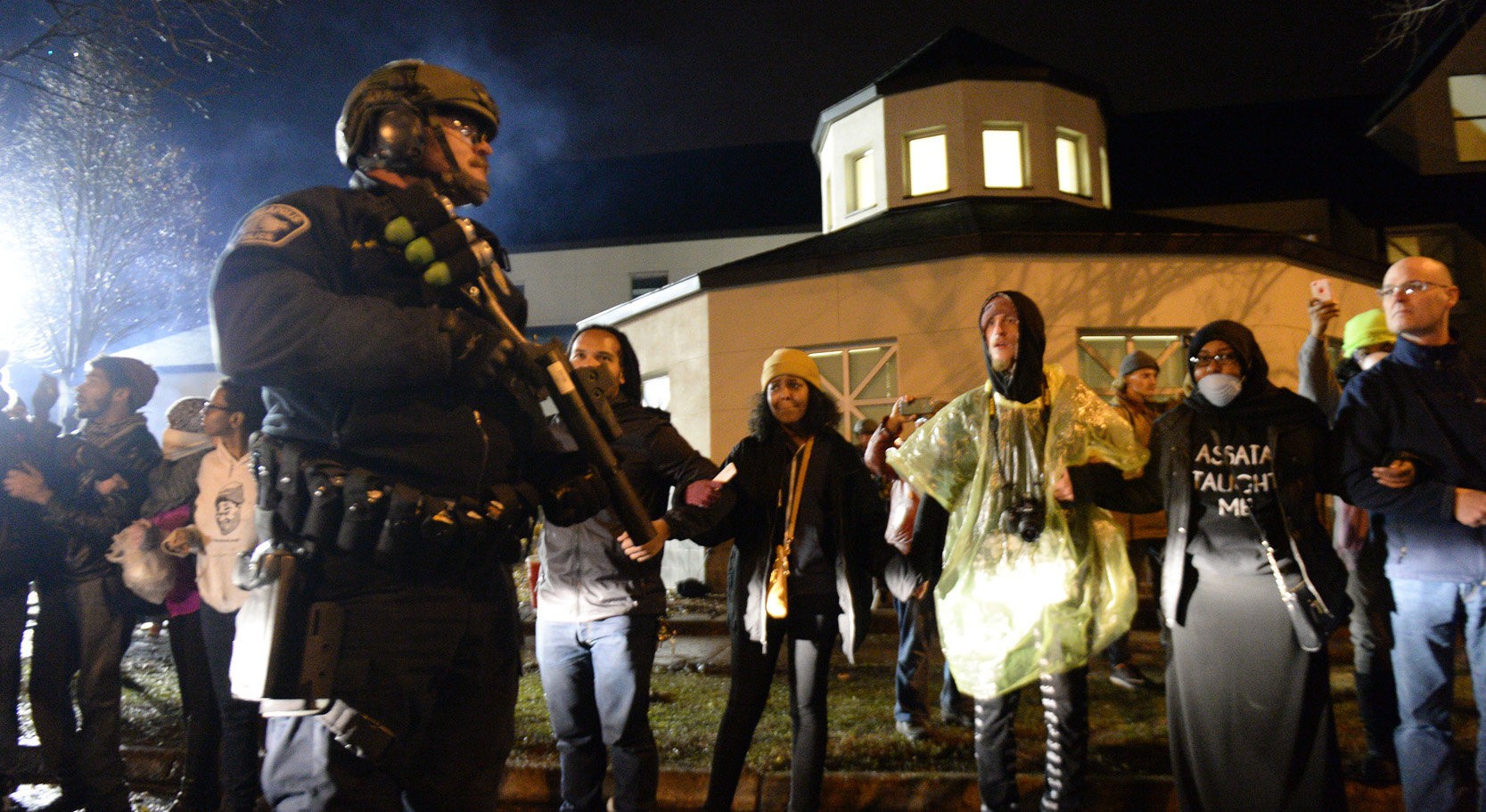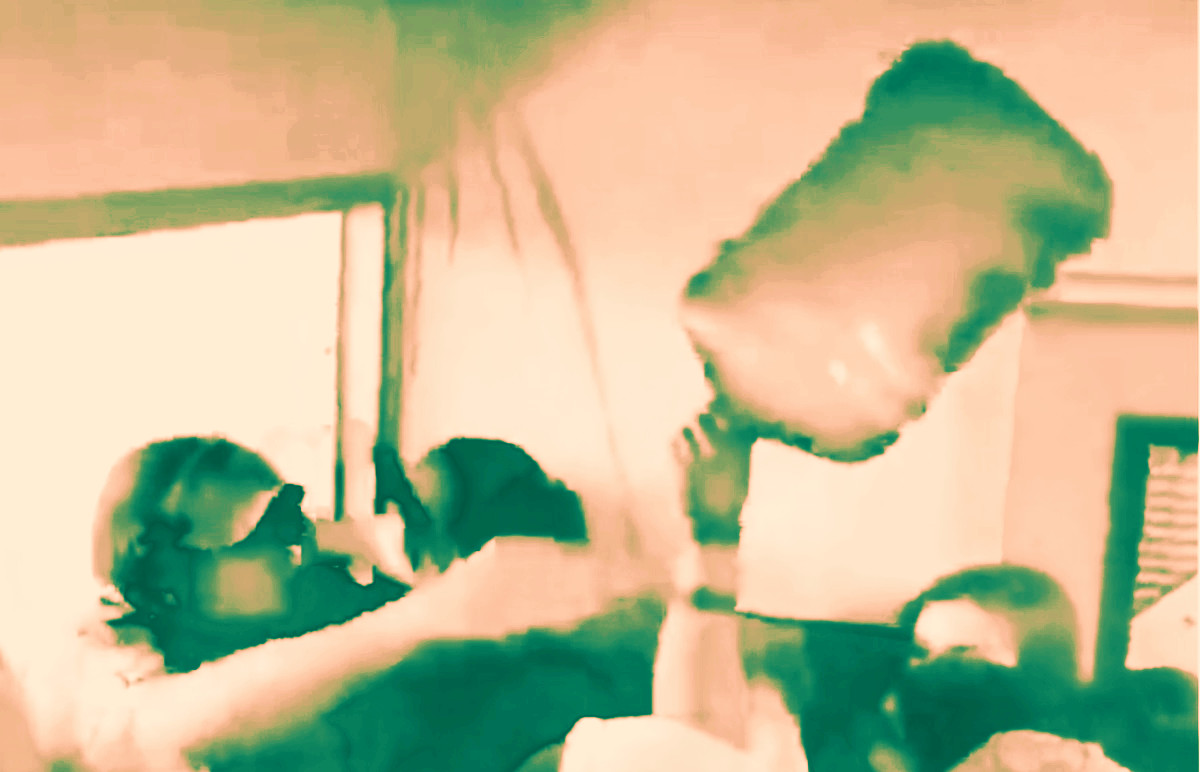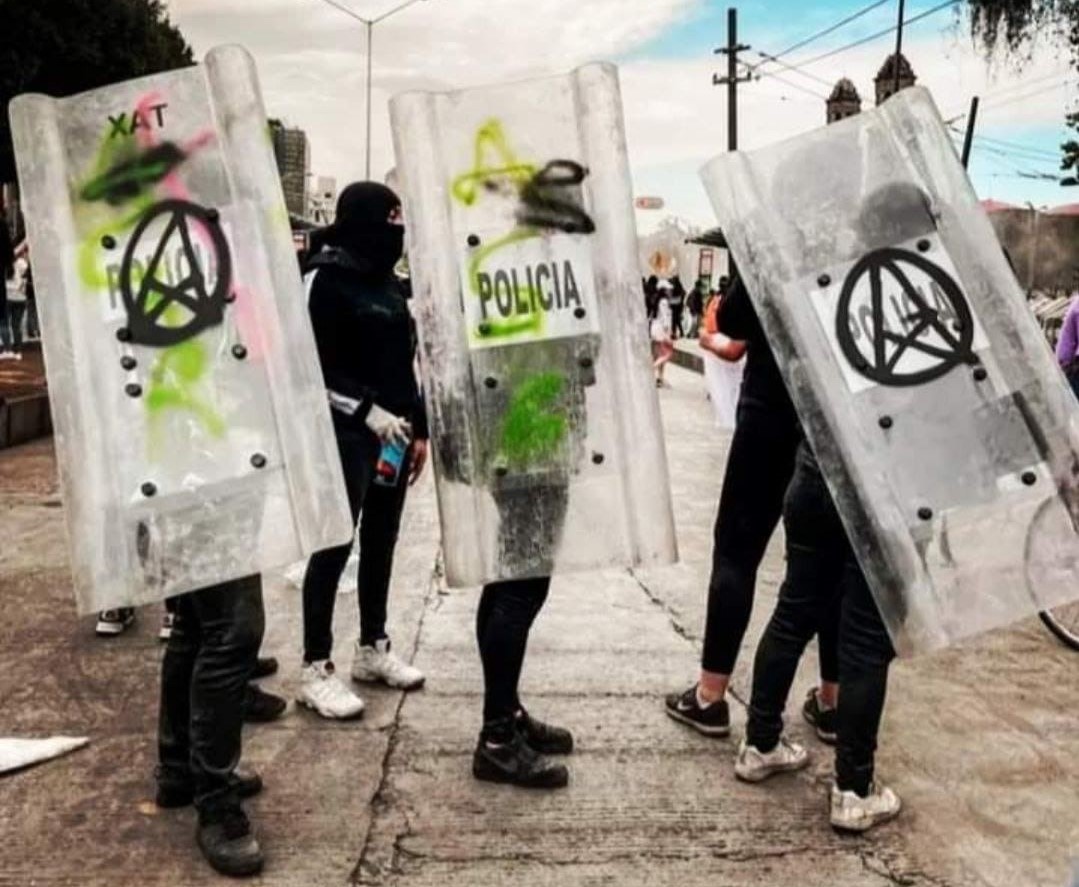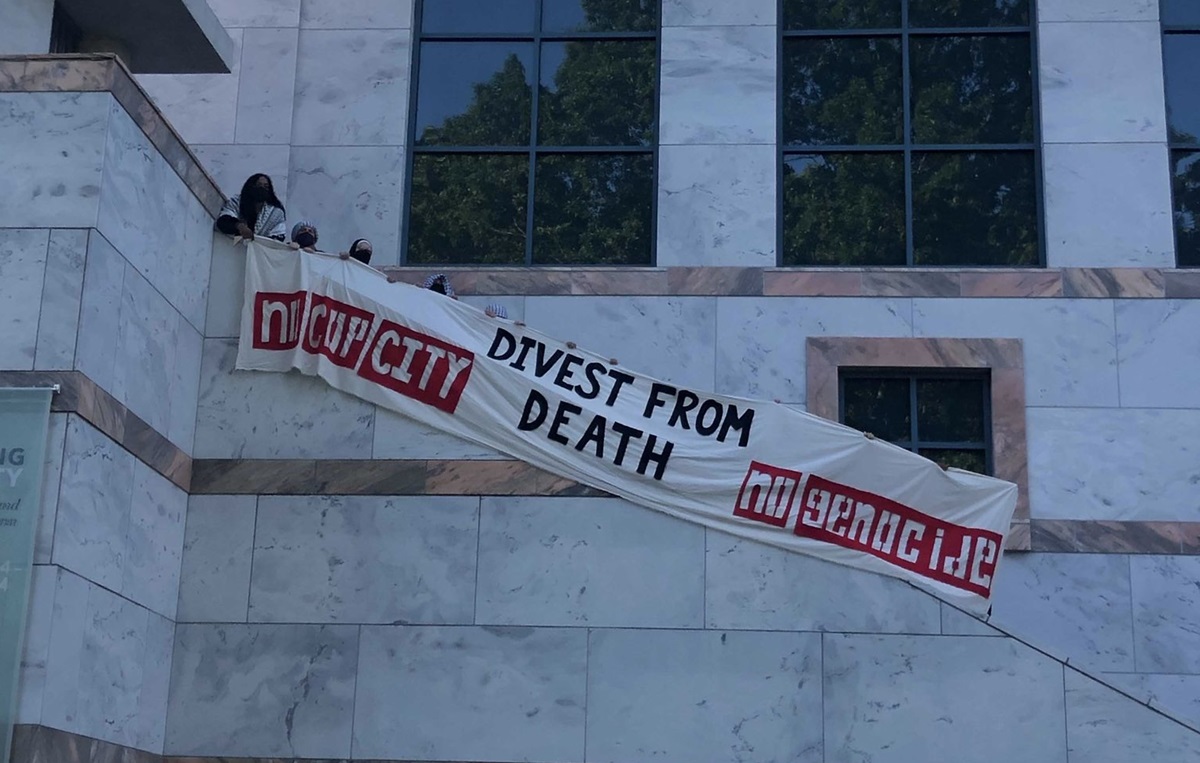Filed under: Analysis, Anarchist Movement, Anti-Patriarchy, Community Organizing, Repression, US, White Supremacy

From Twin Cities General Defense Committee
This is a discussion document written by a member of the Twin Cities GDC on the topic of #CommunitySelfDefense. It does not represent the views or positions of the Twin Cities GDC or the GDC as a whole.
What do we mean by “Community Self Defense?” Are we talking about violence? Why not talk about “Community Autonomy” or “Community Resilience”?
Freedom, autonomy, and resilience are all values we hold and goals toward which we aim. Community Self Defense is our method. By focusing on the methods by which we intend to achieve our goals, we place the emphasis on our our need to act, and the power we hold when we act together. An emphasis on lofty goals, without a focus on how to achieve them, can paradoxically make us feel less powerful.
In contrast, defense is clearly a set of practices and actions that we must take to reach our goals. Defense indicates that we are under attack.
Who is attacking us? That’s complicated. If you’re in the working class, bosses exploit you. Bosses pocket the difference between their costs and our wages, that’s what we call profits. This is a supposedly fair exchange for hours of our lives, sweat, risk, and aggravation.
Because capitalism is legal and enforced, many others attack us as well, assuming that what is legal is always right. The state, lawyers, police, and even quite often other workers attack us, in order to force us to accept our supposed lot in life.
We are the General Defense Committee of the Industrial Workers of the World. The ground of our work is our anticapitalist and working class orientation. We organize to destroy capitalism, and know that in order to so, we must unify the working class which is currently divided against itself by the bosses, who use hierarchy and authoritarian social relations (like racism and sexism) to continue this division. Oppressions are not all reducible to class, but almost all of them are used by the bosses to divide us.
Capitalism is not the only oppression. Racism has organized genocidal violence and unequal status in the Americas since 1492. White Supremacy attacks People of Color in a way that it does not attack white workers. White workers will only rarely understand the experience of living under such an assault. But an assault on Black workers or other workers who are People of Color, is an attack on an inherent part of ourselves. And so the duty of white workers to join in antiracist work is obvious.
Sexism and patriarchy organize mass violence against women, and against all who refuse to conform to narrow notions of gender. Men of the working class of whatever race will rarely comprehend the full weight of these patriarchal attacks. Any misogynistic assault is an assault on the working class. And so the duty of male workers to act against patriarchy becomes clear.
Disdain and prejudice against disabled people structures the daily life of many, in ways that (temporarily) non-disabled people will not be able to understand. Any ableist assault is an attack on the working class. The duty of non-disabled people to join in the fight against ableism is transparent.
We could go on.
Our approach focuses on the fact that we are oppressed by many oppressions based on difference. We know that our exploiters thrive when we are alienated and isolated from each other, when we know little of each other, and are unwilling or scared to learn. All of us will fail to fully understand or appreciate the different experiences of others. This is one of the core challenges we face as a class, and is one of the core challenges we attempt to address within the General Defense Committee.
The way we overcome our mutual ignorance of each other and build solidarity is done in two basic parts. First, it is the responsibility of each and every member to struggle with themselves to learn about other members of the working class, as individuals and as members whose experiences differ from our own. Patiently and careful learning and listening, insisting on respect for ourselves and each other: these are practices that help us build trust, solidarity, and genuine knowledge of each other, and ourselves.
Secondly, it is our collective responsibility to create an environment where we can all learn from each other. The practice of judging each person by their worst current views is a practice of hopelessness that reinforces ignorance. “Calling Out” assumes that a person cannot improve, and that we cannot be part of that process, except through public shaming. Expressing a hopeless judgment of another person in this way is not a strategy for successfully transforming our society. It reinforces ignorance by creating an environment in which each of us becomes increasingly defensive and worried about speaking about our differences, for fear we will be shamed and called out.
Oppression doesn’t have two legitimate sides; the oppressor and the oppressed are not somehow equal. Since each of us is exploited and oppressed in different ways, no one person is all oppressor or oppressed. All of us fear appearing ignorant, and our exploiters rely on this. It is each member’s responsibility to accept and learn how to do better. It is our collective responsibility to create a community in which we can do this. We will continue to do this in the General Defense Committee, welcoming all members and supporters of the working class.
We collectively struggle to educate and inspire more members of our class into situations we were can highlight the interconnectedness of our diverse oppressions, and the possibility of working across these in order to combat them together.
• • •
Some see differences as a weakness. For instance, political parties win by receiving a plurality of electoral votes. To get that plurality, parties and candidates must water down their values, positions, and actions to the ‘least common denominator.’ Soon they resemble their political opponents in all the ways that matter to capitalism. This domestication comes from a system founded on the denial or homogenization of difference.
Instead, we take these differences as the basis of our solidarity, our practice, and our struggle. They give us hope. Many of the differences among the working class are a sign of the resilience of our cultures, our peoples, our traditions, and our families. Despite centuries of murder and exploitation, we survive. The diversity of our people is proof that we do it well.
The General Defense Committee bases its struggle on the differences among the working class. We demand the liberation of all. But we do not assume that all members of the working class will already understand the struggles of other groups. Our work relies on mutual education. We call each other into the revolution and the construction of a better world. This is our first reflex to members who exhibit oppressive ideas or behaviors supported by larger society, but who may transform. Mutual education means all of us. Defensiveness and outrage is rarely effective in transforming another’s thoughts and behavior.
At the same time, we do not tolerate oppressive behavior or speech in our spaces or our groups. We engage members acting in such ways. We try to bring them to a more panoramic view of society, and the way multiple oppressions interlock, and divide us from each other. True liberation will be total. We do not accept that progress requires the oppression of one oppressed group by another.
We want a world in which we are free to enjoy our differences; we will create this world by defending each other. We must treat attacks on any one of us as an attack on us all. We must respond to every attack on any of us as if it were an attack our own safety.
• • •
But, doesn’t “defense” imply a macho, even violent, orientation?
Defense is sometimes violent. For instance, if a group defends a neighborhood from white supremacist attacks, the physical force necessary might reasonably be considered violent. Our commitment to each others’ safety does not allow us to pretend otherwise. We would defend our own selves and families if attacked, and we would do so for others as well.
We use the word ‘defense’ because we take action against attacks on our people. Community Self Defense means any effort that encourages the solidarity, resilience, physical security, and solidarity of the working class. Some cynics believe that ‘communities’ don’t really exist, or that the term can only refer to the limited geographical definition given to it by liberals. We intend to prove that we can create our community by defending it.
This is why the first project of the Twin Cities GDC was a picket training intended to increase labor picket effectiveness, while reducing the physical violence that was almost always directed against us by police and strikebreakers. It is why we have a working group that supports survivors of rape and other forms of sexual assault. This group aims to empower people, without subjecting them to revictimization by the legal process, and to achieve genuinely positive results. It’s why our Harm Reduction group works to save lives endangered by drug use and the war on drugs, and to reduce all the harm associated with both. These are all forms of Community Self Defense. Any project which directly overcomes social divisions in the working class, increasing our autonomy, resilience, solidarity, fighting spirit, organization, and self-determination, is Community Self Defense.
For some of us, every day feels a tightrope walk, alone and unaided while much of the world hurls insults, and the majority of the rest ignore us. Community Self Defense aims to put a net under all of us tightrope walkers, and to get us down off the tightrope entirely, and onto the broad firm ground of a genuine working class community.
![]()




